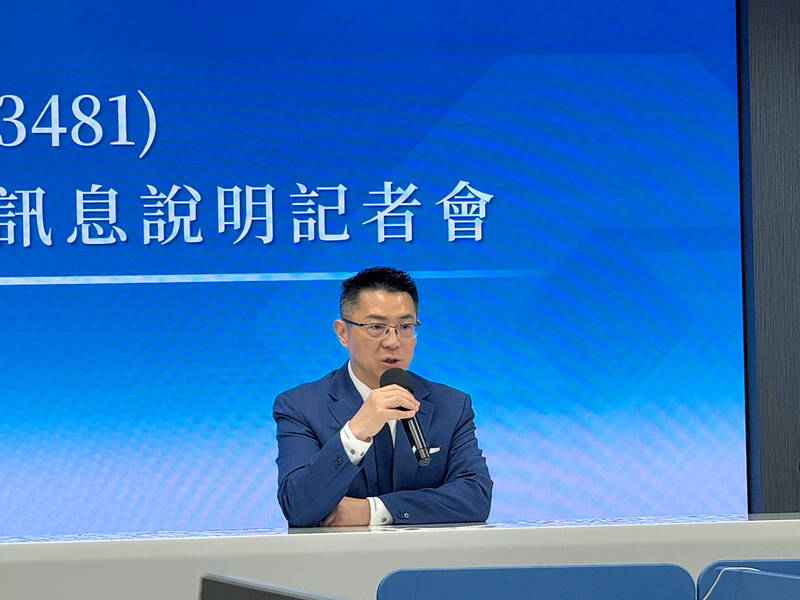Flat-panel display maker Innolux Corp (群創) yesterday said its vehicle display unit, CarUX Holding Ltd, is to fully acquire Japan’s Pioneer Corp in a cash deal valued at about NT$37.7 billion (US$1.3 billion) in a bid to enhance its smart cockpit product lineup for audio and human-machine-interface applications.
Innolux said it has reached an agreement with EQT Partners AB, a global investment firm, to acquire 100 percent of Pioneer shares.
The Japanese firm became a private company after EQT acquired it three years ago.

Photo: Chen Mei-ying, Taipei Times
The strategic acquisition would significantly increase CarUX’s penetration in the Asia-Pacific market and enrich its business portfolios, Innolux and CarUX chairman Jim Hung (洪進揚) told a news conference at the Taiwan Stock Exchange in Taipei.
CarUX is expected to become a tier-one supplier across multiple product platforms, leveraging Pioneer’s strengths in the automotive sound system and human machine interface software developments, Hung said.
By integrating the research and development and manufacturing networks of both companies, CarUX would have better regional capabilities and more agility to serve the evolving needs of global original equipment manufacturers and consumers, he said.
Pioneer has long-term partnerships with major Japanese and global automakers, including Toyota Motor Corp. The company offers a wide range of auto electronics from navigation systems, stereos, audio-video systems and speakers to map software, its Web site says.
The company generated ¥240 billion (US$1.7 billion) in revenue in the fiscal year ending March last year and maintains a healthy financial structure, Hung said.
CarUX plans to arrange a bridge loan and a syndicated loan to fund the acquisition, Hung said.
The deal is not only a capital alliance, but also a strategic synergy between two firms, he said.
The transaction is subject to regulatory approvals and other customary closing conditions. Details of the transaction have not been disclosed.

In Italy’s storied gold-making hubs, jewelers are reworking their designs to trim gold content as they race to blunt the effect of record prices and appeal to shoppers watching their budgets. Gold prices hit a record high on Thursday, surging near US$5,600 an ounce, more than double a year ago as geopolitical concerns and jitters over trade pushed investors toward the safe-haven asset. The rally is putting undue pressure on small artisans as they face mounting demands from customers, including international brands, to produce cheaper items, from signature pieces to wedding rings, according to interviews with four independent jewelers in Italy’s main

Japanese Prime Minister Sanae Takaichi has talked up the benefits of a weaker yen in a campaign speech, adopting a tone at odds with her finance ministry, which has refused to rule out any options to counter excessive foreign exchange volatility. Takaichi later softened her stance, saying she did not have a preference for the yen’s direction. “People say the weak yen is bad right now, but for export industries, it’s a major opportunity,” Takaichi said on Saturday at a rally for Liberal Democratic Party candidate Daishiro Yamagiwa in Kanagawa Prefecture ahead of a snap election on Sunday. “Whether it’s selling food or

CONCERNS: Tech companies investing in AI businesses that purchase their products have raised questions among investors that they are artificially propping up demand Nvidia Corp chief executive officer Jensen Huang (黃仁勳) on Saturday said that the company would be participating in OpenAI’s latest funding round, describing it as potentially “the largest investment we’ve ever made.” “We will invest a great deal of money,” Huang told reporters while visiting Taipei. “I believe in OpenAI. The work that they do is incredible. They’re one of the most consequential companies of our time.” Huang did not say exactly how much Nvidia might contribute, but described the investment as “huge.” “Let Sam announce how much he’s going to raise — it’s for him to decide,” Huang said, referring to OpenAI

The global server market is expected to grow 12.8 percent annually this year, with artificial intelligence (AI) servers projected to account for 16.5 percent, driven by continued investment in AI infrastructure by major cloud service providers (CSPs), market researcher TrendForce Corp (集邦科技) said yesterday. Global AI server shipments this year are expected to increase 28 percent year-on-year to more than 2.7 million units, driven by sustained demand from CSPs and government sovereign cloud projects, TrendForce analyst Frank Kung (龔明德) told the Taipei Times. Demand for GPU-based AI servers, including Nvidia Corp’s GB and Vera Rubin rack systems, is expected to remain high,